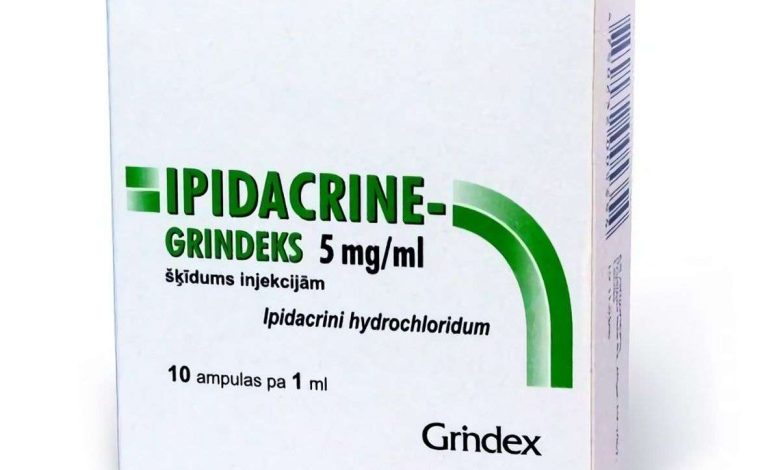Ipidakrin: instructions for using the medicine, structure, Contraindications

When ATH: N07AA
Ipidakrin: pharmachologic effect
Cholinesterase inhibitor. It prevents enzymatic hydrolysis of acetylcholine and extends its action. Blocking potassium channels membrane depolarization and promotes their. It stimulates synaptic transmission at neuromuscular endings, conduction of excitation in nerve fibers, It enhances the action of acetylcholine on smooth muscle and other mediators (incl. epinephrine, Serotonin, gistamina, oxytocin), restores neuromuscular transmission and conduction of excitation in the peripheral nervous system (due to violations of various origins: injuries, inflammation, actions of local anesthetics, antibiotics, toxins, potassium chloride). Increases tone and contractility of smooth muscles of internal organs, incl. Gastrointestinal tract and bronchus (until bronchospasm), slows heart rate, increases the secretion of the salivary glands, contractile activity of the myometrium, the tone of the skeletal muscles.
It has a stimulating effect on the central nervous system in conjunction with individual manifestations of sedation; improves learning and memory.
Ipidakrin: pharmacokinetics
Data provided gne.
Ipidakrin: testimony
- Peripheral nervous system diseases (neuritis, polyneuritis, polyneuropathy, poliradikulopatiâ), bulbar paralysis and paresis.
- During the recovery period, with organic lesions of the CNS, accompanied by movement disorders.
- Myasthenia, myasthenic syndrome.
- Demyelinating diseases (in the complex therapy).
- Alzheimer's Disease, senilynaya alytsgeymerovskogo dementia type.
- Functional disorders of the central nervous system (memory decline, ability to concentrate, motivation, initiative, disorientation, emotional lability and others.) in encephalopathy (Traumatic, and other vascular genesis), violation of cerebral circulation, traumatic brain injury, cerebral dysfunction with the difficulty of learning in children.
- The weakness of labor.
- Intestinal atony.
- Intoxication antiholinergicheskimi sredstvami.
Ipidakrin: dosing regimen
Inside, n / a, / m. A single dose - 10-40 mg. The maximum dose - 200 mg / day. Multiplicity of reception and duration of treatment depend on the evidence.
Ipidakrin: side effects
From the digestive system: anorexia, hyperptyalism, nausea, vomiting, increased peristalsis, diarrhea, jaundice.
CNS: dizziness (after reapplying), ataxia.
Allergic reactions: skin rash, itch.
Other: Mr. manifestations holinostimuliruyuschego action - bronchospasm, bradycardia.
Ipidakrin: Contraindications
Epilepsy, extrapyramidal disorders with hyperkinesis, angina, vыrazhennaya bradycardia, bronchial asthma, propensity to vestibular disorders, pregnancy, lactation, Hypersensitivity to ipidakrinu.
Ipidakrin: Special instructions
Caution should be used for stomach ulcers, thyrotoxicosis, diseases of the cardiovascular system. It is necessary to take into account the ability to raise the tone of the uterus ipidakrina.
Effects on ability to drive vehicles and management mechanisms
Do not use in patients, whose activity is connected with driving vehicles and work, require high concentration and speed of psychomotor reactions.
Ipidakrin: drug interaction
In an application ipidakrin increases the sedative effect of drugs, providing a depressing effect on the central nervous system, ethanol, effect of other cholinesterase inhibitors, and m-cholinomimetics.
In patients with myasthenia gravis in the application ipidakrina against other cholinergic agents increases the risk of a cholinergic crisis.
While the use of beta-blockers enhanced bradycardia.
Ipidakrin reduces the effect of local anesthetics, antibiotics, potassium chloride.
Atropine metotsiniya iodide and reduce the severity of symptoms of overdose.
